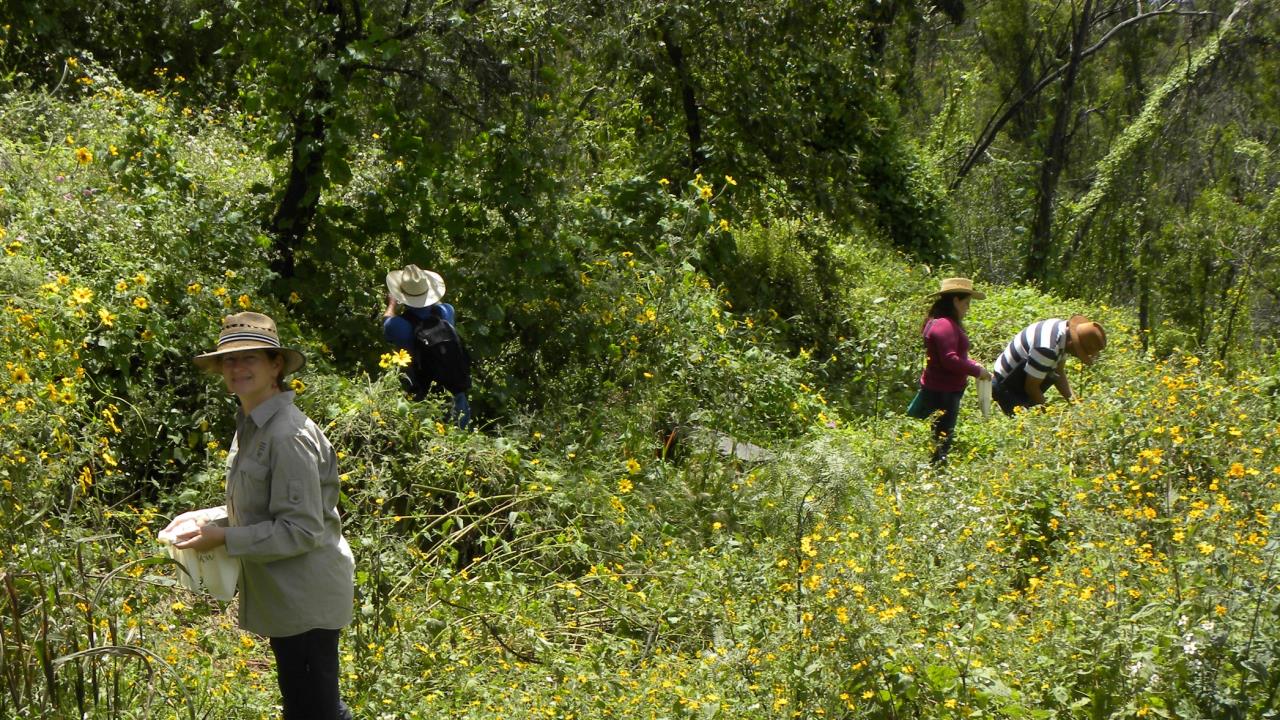Securing The Global Future Food Supply
 |
| Dr Tiziana Ulian (left) is Plant Ecologist at the Royal Botanic Gardens, Kew. |
"From a single bean, you can obtain milk. You can obtain oil. And you can grind the bean and obtain flour, which can be really useful for baking. The potential of this plant is really incredible.""[Its tubers] are full of water ... which is really good for the species to be able to grow in very dry environments, like in southern Africa in the Kalahari Desert.""This is really a very scary idea [the world's dependence on only 15 crops]. We are relying on just these 15 plants while the biodiversity there is really wide.""We shouldn't just focus on a small number of species. Not just for conservation, but it will also help our health and our food security for future generations.""Biodiversity is essential to food security and nutrition. Not only at the local level but at the global level. And it's important to get to know and use this biodiversity -- this diversity of edible plants and edible fungi. But we also shouldn't forget the wealth of traditional knowledge about their uses and practices.""I think it's important to have a holistic view. By using this diversity, we can have a sustainable agriculture and at the same time, help protect the environment to deliver its ecosystem services. Because it's not just the food."Tiziana Ulian, senior research leader, Natural Capital and Plant Health department, Royal Botanical Gardens, Kew
 |
| The Millennium Seed Bank hides an underground collection of over 2.4 billion seeds from around the world, banking them to conserve them for the future. |
Fully ninety percent of energy intake worldwide emanates from 15 food crops. Over half the global population [just over four billion] rely on maize, rice and wheat as staples. Kew scientists and their collaborators have identified no fewer than 7,039 edible plant species in the course of their research. "We keep discovering new plants every year, so there is the potential that this number can grow more and more."
The morama bean is but one of almost one hundred plant species that Dr.Ulian and her group of researchers based at the Millennium Seed Bank in rural Sussex, England have identified as holding potential for "future-proofing" global food systems. The 2020 report of Kew's State of the World's Plants and Fungi representing a collaboration of 210 researchers in 42 countries, titled "Unlocking plant resources to support food security and promote sustainable agriculture" has been published in the journal Plants, People, Planet.
The morama bean is large and smooth, a chestnut colour and is a multi-purpose food source holding out promise as a future food source. It is well-adapted to harsh conditions as a native of the arid savannahs of southern Africa where it is widely eaten, with a flavour similar to that of roasted cashew nuts. It is used in various forms; milled into powder for porridge and drinks or boiled along with maize meal.
Of the total plants identified only 417 are in current use as food crops, leaving thousands of "overlooked and underutilized plants", some of which may have been grown in the past, but fallen out of favour; others locally known, not globally. Some may be uncultivated plants collected from the wild.
 |
| The Millennium Seed Bank safeguards wild plant diversity. ©RBG Kew |
The Millennium Seed Bank represents a collection of over 2.4 billion seeds, the world's largest cache of seeds from wild plants. "We carry out the research to look at the germination requirements, how to propagate [them] and how to unlock their use", explained Dr.Ulian. "Our research efforts are into understanding the diversity of wild species out there that can feed for the world." A collaborator in Botswana has aided the MSB's work on the morama bean by collecting seeds.
Once the researchers developed their list of edible plants to be included in their 2020 report, they then distinguished close to one hundred "future foods" with the use of their collective experience rather than depending on an algorithm to select species from across the globe, highlighting five of the one hundred edible plants for the report:
- the morana bean;
- akkoub, eaten as a vegetable in the eastern Mediterranean and Middle East; fried with olive oil and garlic, pickled, or folded into omelettes;
- fonio, a wild grass species growing in West Africa, "a potential staple food" high in iron, calcium and several essential amino acids;
- pandanus, a drought-resistant coastal tree that grows from Hawaii to the Philippines and produces fruit and leaves with a variety of uses;
- chaya, a shrub with "highly nutritious" leaves and shoots native to Mexico's Yucatan Peninsula.
 |
| Seeds stored at Kew's Millennium Seed Bank, Wolfgang Stuppy © RBG Kew |
Food insecurity and obesity are two challenges facing humanity, points out Dr.Ulian. "When we talk about food security, it's not only about quantity but also it's the quality of the food." The researchers looked at the edible plants' other uses; 70 percent are medicinal as well as edible; close to 60 percent can be used for materials (e.g., in construction); and 40 percent have environmental uses (e.g., enrich the soil). The baobab, "an iconic, charismatic plant" from Madagascar, northwestern Australia and various parts of the African continent, epitomizes the versatility researchers look for.
The fruit and seeds of the baobab are eaten locally; the white pulp is used medicinally to treat fevers and diarrhea, and the bark used to produce clothing, paper and rope. Local traditions associate with such crops of the future should be recognized, looking to their future uses as global food, points out Dr.Ulian.
 |
| Aduna, The Baobab tree, Africa's iconic "Tree of Life" |
Labels: Edible Plants, England, Kew, Millennium Seed Bank, Research, Seed Bank, Sussex

0 Comments:
Post a Comment
<< Home